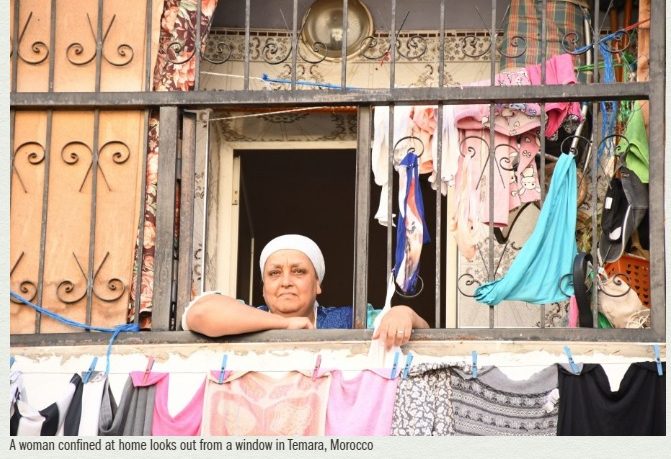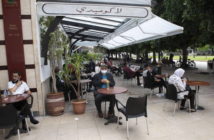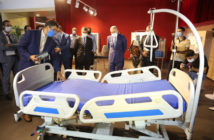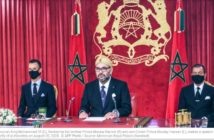Byline Times
Jonathan Fenton-Harvey reports on how the popular tourist destination is providing hospitality and support to stranded travellers as well as its own citizens.
n a heart-warming display of solidarity, large numbers of Moroccans gather on their rooftops to recite the Qu’ran and pray; a sense of oneness in society amid Morocco’s lockdown to combat the spread of the Coronavirus.
While there is an abundant focus on the inevitable healthcare and economic damage caused by the COVID-19 pandemic, Morocco’s widespread solidarity – which breaches all societal divisions – is a shining example of how those in society can help one another in such a period of crisis. A profound sense of hospitality and productive patriotism within Morocco has driven people from all backgrounds to come together to combat this virus and care for those who will be impacted.
Amid scenes of panic-buying and the hoarding of goods in supermarkets and lax compliance with social distancing advice in Western countries, Morocco has shown the strength of decisive action and consideration for one another, to minimise the virus’ spread and damage, especially towards society’s most vulnerable.
On 2 March, Morocco detected its first case of COVID-19. Dozens more cases were then discovered among visitors visiting the popular tourist destination. The Government acted decisively yet progressively to limit the spread, shutting down all airports, flights and passenger ships to and from the country until further notice, whilst aiming to ease the societal impact of the lockdown.
“Morocco was the first regional country to shut its borders, seeking to contain the possibility of it infecting more people,” Hajar Bennar, Research Associate at Rennes 2 University, told Byline Times. “In my opinion, and I think the overwhelming majority of Moroccans feel this way, the success of such steps is thanks to the King who preferred to help his people rather than economy.”
THE CORONAVIRUS CRISIS
Myanmar’s Lockdown on Truth
Tasnim Nazeer
Inter-city transport, education institutions – which have switched to distance learning – and non-essential business have all stopped. Morocco has also closed all mosques, cafes and restaurants, sports and entertainment venues. To alleviate the inevitable economic burden from its lockdown, on 19 March it announced it will pay a stipend to people who lose their jobs, while defer tax and debt payments to small businesses.
More significantly, the Government called for a special fund for society, which by 25 March had exceeded 25 billion Moroccan Dirhams (approximately $2.54 billion), to which Government ministers, large companies, banks and other wealthy figures have contributed. Several companies within Morocco’s food industry will also donate millions of food products to assist families during the lockdown.
“All institutions, including political parties, and civil society have not hesitated to follow the King’s initiatives,” added Bennar. “Wealthy people, middle-class and poorer people have all shown solidarity with one another.”
Meanwhile, driven by an urge to help those in desperate need in these uncertain times, Moroccans are taking part in civil society initiatives, many of which are independently motivated gestures.
“People here were very helpful for dealing with the virus’ outbreak,” a student in Casablanca told Byline Times. “Most people stayed home even before the quarantine was announced.”
A poll by the Moroccan Institute for Policy Analysis carried out between 14 and 19 March indicated that 82% of Moroccans completely avoided leaving their homes, while 88% would not consider any form of travelling in this time.
In major cities such as Rabat and Marrakech, people are also offering empty houses to doctors near hospitals. In Casablanca, restaurants are offering meals to medical staff.
THE CORONAVIRUS CRISIS
China Capitalises on COVID-19 By Blaming Foreigners
CJ Werleman
“Social media initiatives have enabled and encouraged people to provide food and medicine to each other, especially to elderly people and those suffering from a chronic disease,” the student added. “Moroccans are very friendly and helpful to each other. I am really proud of my people.”
Another student, Safae Boufker, from Azrou, said that in her city many people buy food and other essentials for poor families and many small business owners are willingly giving a month’s salary to workers. Other civilians have also used cars and motorbikes to deliver food to families and those who cannot leave their homes.
Not only are Moroccan’s civilians benefitting from the hospitality of such civil society initiatives, tourists and other foreigners left stranded due to international flight restrictions have also reported receiving help. Many Americans complained that the US State Department was neglecting them and that Moroccans were treating them better than their own Government. Morocco announced that it would allow “exceptional flights” into the country to repatriate tourists and has since helped thousands of people from the UK and other countries to return home. Moroccan schools and other institutions had hosted tourists who had been stranded.
“Despite the fragile economic situation Morocco faced before the pandemic, the actions of the Government and civil society show it is among the first countries globally to sacrifice its own economic welfare to prevent this virus from spreading,” Soufiane Agouame, a researcher in civil and business law, told Byline Times. “This move, in turn, has inspired Moroccans to trust the Government’s measures and help one another in this time of crisis.
“The Coronavirus situation shows the societal benefits of cohesion and solidarity with one another and shows how it is important to consider the positives of this difficult period, rather than just the negatives.”







